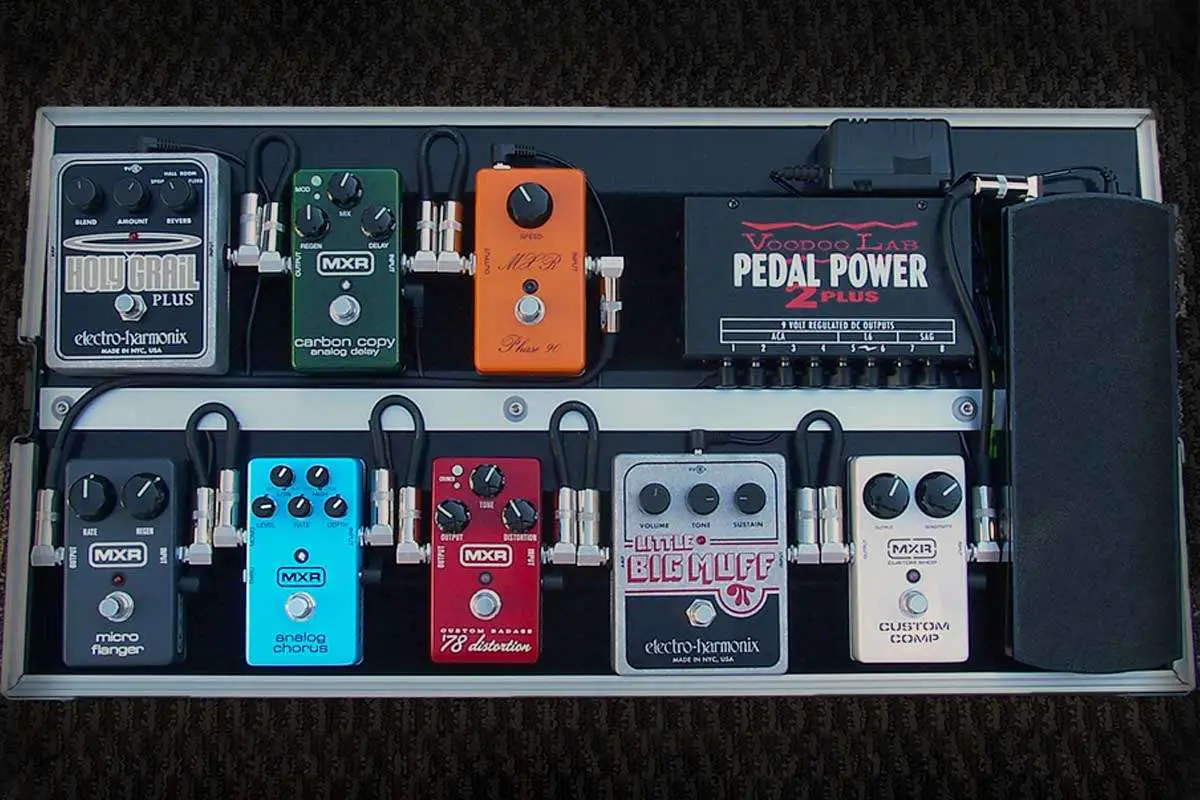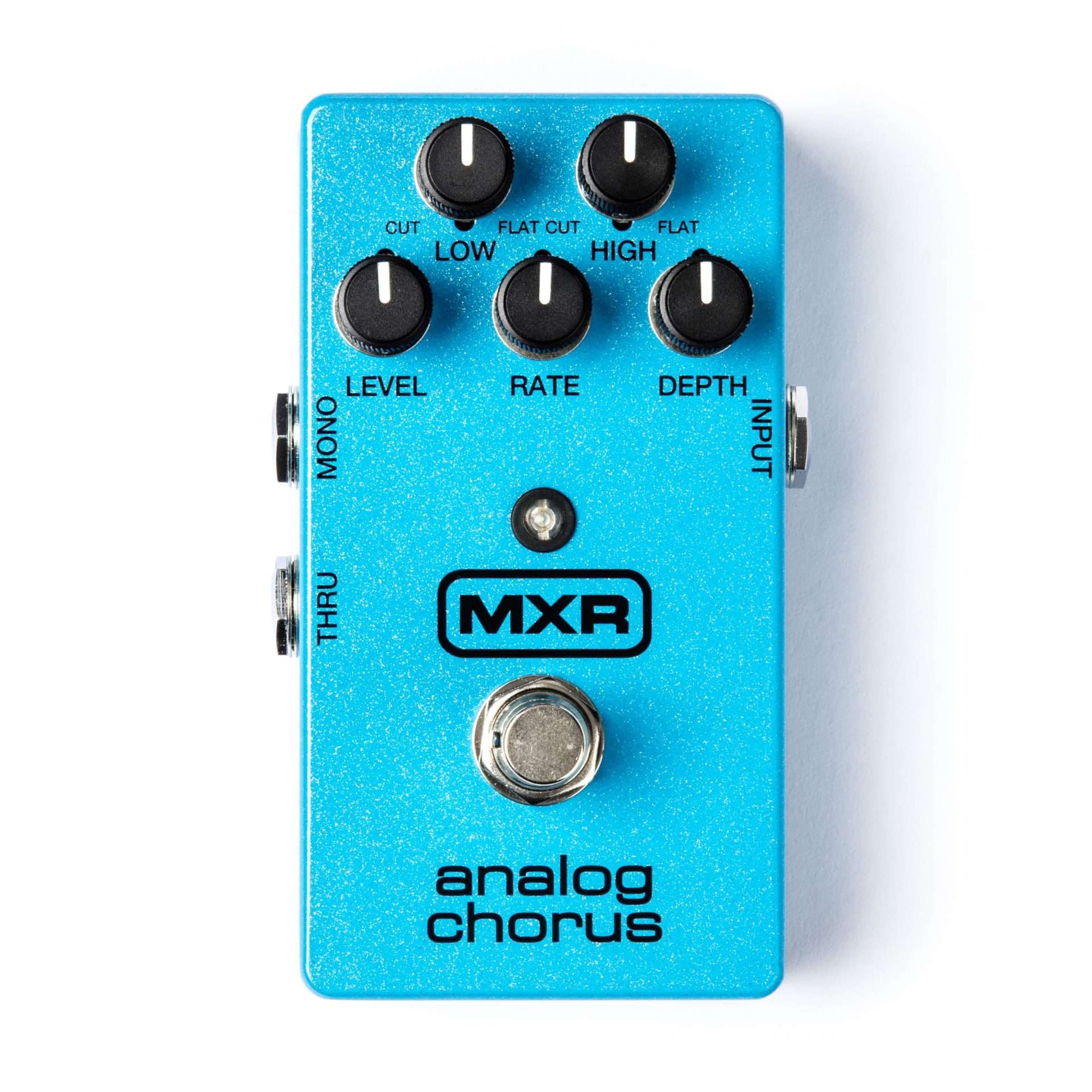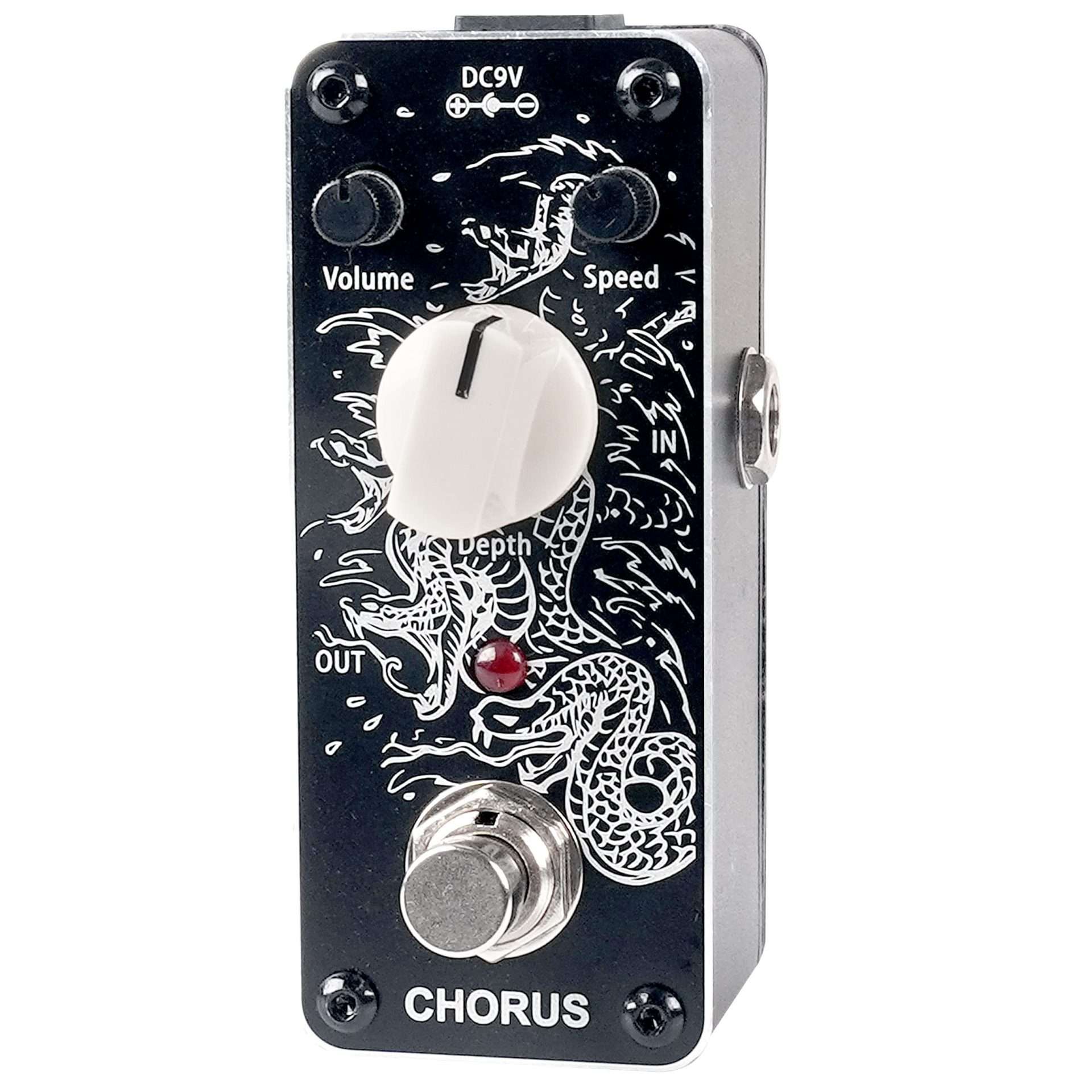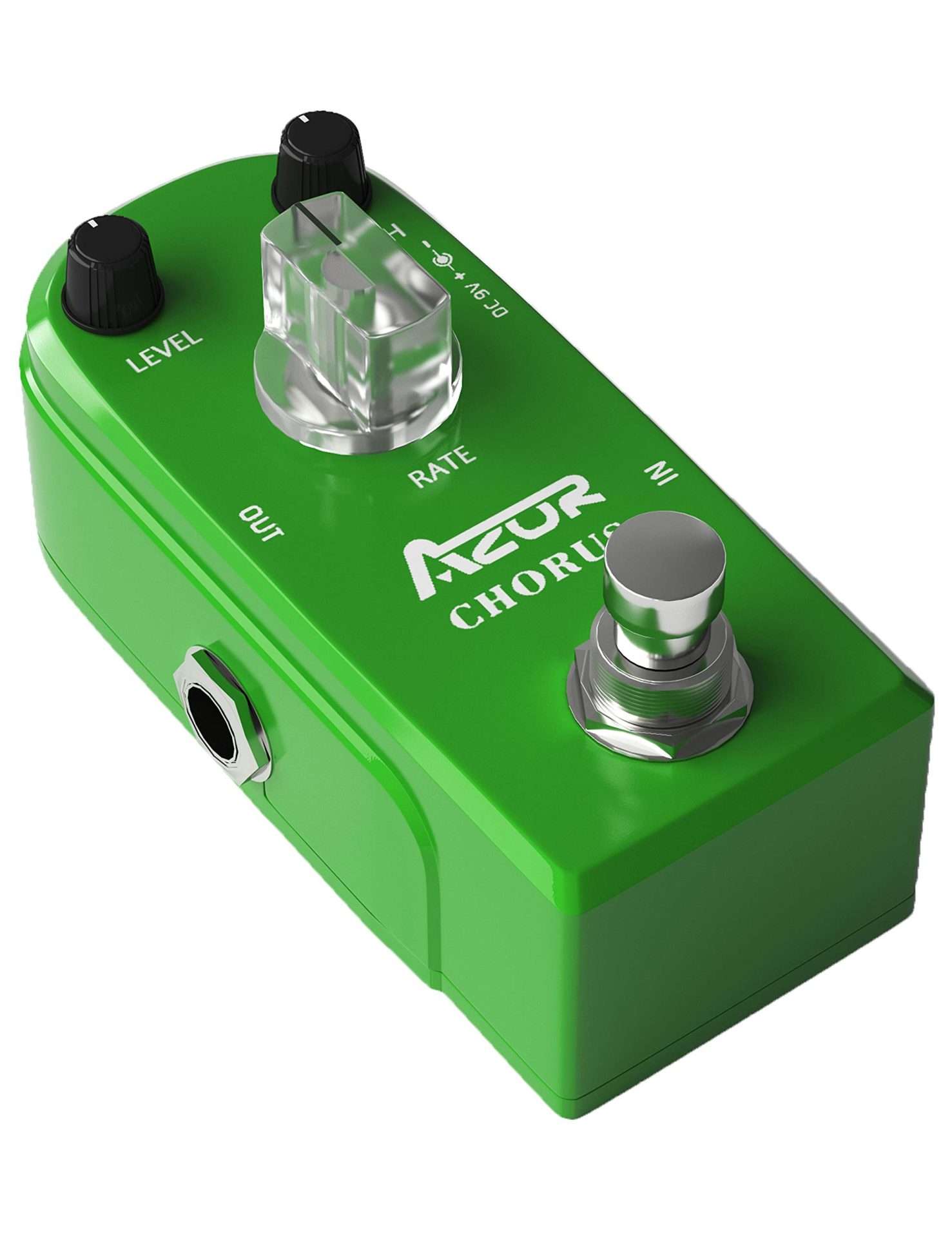Chorus pedals are an essential tool for musicians looking to add depth, richness, and a fuller sound. By duplicating the original signal and altering the pitch of the duplicate slightly, chorus pedals create a sound that seems to have multiple instruments playing in unison. The effect can vary from a subtle, natural doubling to a more pronounced, dreamy swirl that’s particularly popular in genres like shoegaze, pop, and psychedelic rock. Below are some of the best chorus pedal options for new players looking to build their first pedalboard.
When searching for the best chorus pedal, it’s crucial to consider the pedal’s versatility, the quality of the effect it produces, and how well it meshes with your existing setup. The right chorus pedal should offer a range of depth and speed adjustments while maintaining clarity and tonal integrity even at higher effect levels. Analog pedals are often celebrated for their warm, organic sound while digital pedals can provide a more pristine effect with additional features.
Another key factor is the build quality and the pedal’s footprint on your pedalboard. Durability is essential for equipment that will be used frequently or transported to gigs. Moreover, some musicians may require additional functionality like stereo output for a more expansive sound or battery operation for convenience.
As we examine the chorus pedals that stand out in today’s market, we keep these factors in mind. Our testing process involves not only the quality of the sound but also the usability and construction of the pedals. This ensures that when we share our findings, they serve the practical needs and creative aspirations of musicians across styles and setups.

Top Chorus Pedals for Your Guitar Rig
In crafting our roundup of the best chorus pedals available today, we’ve thoroughly researched and evaluated a variety of options to ensure that every musician can find the perfect match for their sound. Whether you’re looking to add a subtle width to your clean tones or aiming for the lush, sweeping effect that defines an entire musical era, our picks cater to an array of styles and budgets. Each pedal in our selection stands out for its quality, usability, and the unique character it brings to your pedalboard.
MXR Analog Chorus

We recommend this pedal for its warm analog tones and flexibility in tone-shaping, an excellent choice for both stage and studio use.
Pros
- Provides a rich, classic chorus effect with analog circuitry
- Tone shaping is versatile with high and low frequency cut controls
- Sturdy construction suitable for rigorous touring conditions
Cons
- Some users report a noticeable drop in volume when engaged
- Requires a separate purchase of a 9V power supply if battery use is not preferred
- The richness of the analog sound might not appeal to those seeking digital precision
We’ve had the chance to tour with the MXR Analog Chorus pedal, and it’s a staple on our pedalboard. The warmth of the analog tone spiced up our sound, adding a dimension that felt like stepping back into the classic ’80s rock era. The dual high and low cut knobs offered us the control we needed to fine-tune the sound, which proved to be crucial during live performances, allowing us to stand out without being too intrusive.
In the studio, we appreciated the pedal’s solid build. It looks and feels like it could handle accidental drops and the rigors of constant travel — a real workhorse. Most importantly, the sonic qualities of the pedal’s bucket-brigade circuitry never failed to inspire us. There was a definite sense of reliability and character when it was part of our rig.
After spending quality time experimenting with it, we observed that the pedal cheekily sips volume when it’s on, although this can be managed with the level control. For our gigs, we always ensured we had a stock of 9V batteries, as the pedal doesn’t come with its own AC adapter. And while we’re suckers for the lushness of analog chorus, some may find it less appealing if they’re after the pristine predictability of digital effects.
In conclusion, the MXR Analog Chorus feels like discovering a hidden gem that’s been there all along. It’s a reliable sidekick for the road, and in the studio, it provides a sonic landscape that begs to be explored.
Boss Super Chorus

We find this pedal a versatile addition to any rig, dialing in everything from subtle shimmer to lush, wide sonic spaces effortlessly.
Pros
- Creates a wide spectrum of chorus effects with great clarity
- True stereo output adds spaciousness to your tone
- Built to last with that known Boss durability
Cons
- Might be a bit complex for newcomers to get their ideal setting quickly
- May not be the most budget-friendly option for all
- Tone shaping options, while robust, can be overwhelming at first
From the moment we plugged in the Boss Super Chorus, the quality of output was clear. The pedal provides a rich, clean chorus that can range from a mild thickening to a deep, swirling effect. Its controls, including depth and rate, are quite responsive and offer precise adjustments, allowing for a fine-tuning of the chorus effect to suit various playing styles and gear.
What struck us was the pedal’s build quality. Boss is known for their rugged designs, and this pedal is no exception. It feels like it can handle the wear and tear of regular gigs and rehearsals without any concerns. The accessible knobs and jacks are well-placed, offering a user-friendly interface that speaks to Boss’s attention to the players’ experience.
However, we recognize that some players might find the options a bit much at first. With various parameters to tweak, including effect level and EQ, it can take some time to discover the range of sounds this pedal is capable of producing. But once mastered, the Super Chorus becomes a powerful tool giving a distinct character to your sound.
In practice, the stereo outputs are particularly impressive, allowing for an expansive stereo soundstage that can make a mono guitar signal bloom with depth and width. Whether in a studio or live setting, the enriched sound can elevate even the simplest chord progressions into something special.
Overall, the Boss Super Chorus holds its place as a staple on our pedalboard. It’s that reliable component we turn to when our sound needs that extra dimension, whether it’s coloring the clean passages with a subtle sparkle or going all out with a wide, atmospheric vibe.
Donner Tutti Love Chorus

If you’re in search of a pedal that adds a rich depth to your guitar tone, the Donner Tutti Love Chorus could be exactly what you need.
Pros
- Emulates classic chorus tones beautifully
- Rugged build quality; withstands regular use
- True bypass ensures your signal remains untainted
Cons
- Lacks a power supply in the package
- Some may find sound customization limited
- The small size may be challenging for some users to manipulate on a crowded pedal board
We just put the Donner Tutti Love Chorus to the test, engaging its smooth analog waveforms, and the tonal quality it adds to our guitar is impressive. The yet nuanced chorus adds that sought-after warmth without compromising the clarity of the original signal—a proper guardian of tone.
With the simple interface featuring a LEVEL knob beside the classic DEPTH and RATE controls, we find tailoring the effect to our playing is intuitive. Plus, the fact that we don’t hear any signal degradation when the pedal is turned off speaks volumes about its true bypass wiring.
However, we notice that the pedal doesn’t include a power source. This means we need to have a 9V DC power supply ready before we can enjoy the rich sounds. While the size makes it convenient for pedalboards with limited space, those of us with larger feet or who perform in dimly lit venues might struggle a bit to hit the switch accurately.
Overall, our experience shows that the Donner Tutti Love Chorus deserves a spot on the pedalboards of guitarists eager for that lush, classic chorus effect without breaking the bank.
JOYO Narcissus Chorus

We find the JOYO Narcissus Chorus to be a valuable tool for guitarists seeking to diversify their sound palette with rich and versatile chorus effects.
Pros
- Versatile tone from subtle shimmer to intense vintage chorus
- True bypass preserves signal integrity
- LED ambiance lighting enhances stage presence and use
Cons
- Some may find the wave effect slightly uneven
- Light strip readability can be poor at certain angles
- It may produce noise at higher settings
After testing the JOYO Narcissus Chorus, we believe it stands out in the crowded field of guitar effects. Its ability to deliver an array of chorus sounds—from deep and ethereal to biting and vibrant—makes it a standout. The true-bypass wiring ensures that when off, the pedal has no impact on the tone of the guitar, a feature we particularly appreciate.
The build of this pedal impresses us. The metal alloy casing feels robust and reliable underfoot, prepared for heavy use whether in the studio or on the road. The toggle switch between vintage and modern settings offers a playful range of sonic options without complicating the user experience.
The ambient LED lighting not only gives the pedal a distinctive appearance on any pedalboard but also proves functional in low-light environments—a subtle but useful feature during performance. However, we found the wave effect can be slightly uneven in character, which may not suit all playing styles. While the illumination is a nice touch, we noticed the legibility of the pedal’s settings can suffer at certain angles or under intense stage lighting.
Overall, the JOYO Narcissus Chorus pedal has both delighted and surprised us with its musicality and the wide range of chorus effects it can produce. Its solid construction and thoughtful features, such as the ambient lighting, add to a user experience that is both tactile and visually appealing. Notably, at its price point, it provides exceptional value, suitable for a variety of playing styles and musical genres.
FLAMMA FC05 Mini Mod

We found that this nifty pedal spruces up performance with its robust selection of effects.
Pros
- Offers a versatile range of modulation effects in a single unit
- Sturdy construction due to its all-metal design.
- Its mini size is perfect for a crowded pedalboard.
Cons
- A power supply is not included, requiring an additional purchase.
- Digital signal processing might not suit purists looking for analog tones.
- Vibrant color may not appeal to players preferring subdued aesthetics.
Upon laying our hands on the FLAMMA FC05, we were immediately taken by the diverse modulation options packed into such a diminutive package. The pedal’s ability to add depth with its chorus or shake things up with a tremolo impressed us greatly, considering its small footprint.
Its build quality deserves applause, too; the full metal shell could handle the hustle of gig life without breaking a sweat. This makes us confident about its longevity, an assurance that’s crucial for gear that’s constantly on the move.
While testing, the lack of a power supply caused a slight hiccup in our jam session—something to keep in mind if you’re eager to play right out of the box. But once powered up, the ease of use and quality of sound had us forgetting that minor snag quite quickly. The colorful casing might be a bit much for some, but it’s a refreshing departure from the usual black and gray stompboxes.
In a nutshell, the FLAMMA FC05 Mini Mod delivers a suite of effects capable of elevating your sound with versatile, space-saving charm. It’s an easy recommendation for guitarists looking to diversify their sonic palette without compromising pedalboard real estate. It was also one of our top picks for the best phaser pedals out there.
Behringer UC200

Our take on the Behringer UC200 Ultra Chorus Pedal is that for its price point, it’s a solid entry-level option that adds depth to your guitar sound with ease.
Pros
- Adds a rich and thick chorus effect enhancing guitar tones
- Simple to use with intuitive controls for tailoring your sound
- Solid construction and good value for money
Cons
- The plastic casing can feel less durable than metal enclosures
- Tends to distort at high input volumes, requiring careful gain staging
- Excluding the power supply necessitates an additional purchase
The moment we engaged the Behringer UC200, a lush breadth enveloped our sound that surprisingly rivaled more expensive pedals. The twist of a knob was all it took to craft undulating waves that brought each chord to life.
Navigating its controls was a breeze; tweaking the Level and Rate helped us find just the right intensity for our playing session. Whether we blended it subtly beneath our rhythm or let it lead in a solo, the pedal remained responsive and articulate.
Lastly, while we reveled in the pedal’s sonic qualities, we observed the plastic body might not fare well with aggressive stage use. Furthermore, we had to play around with the input level to prevent unwanted distortion. And remember, should you decide to add this to your board, consider investing in a compatible power supply.
Sondery Mini Chorus

We’ve discovered that the Sondery Mini Chorus is a solid pick for guitarists seeking to embellish their sound without breaking the bank.
Pros
- Compact design easily fits any pedalboard.
- True bypass preserves your guitar’s tonal integrity.
- Engaging artwork and robust construction enhances aesthetic and durability.
Cons
- No power supply included, requires separate purchase.
- Some users may find the sound doesn’t match expectations.
- Reports of noise issues in certain units, potentially isolated incidents.
Just had the chance to play around with the Sondery Mini Chorus, and it easily fits into our pedal setup, thanks to its small footprint. The speed and depth controls are intuitive and responsive, allowing us to dial in a rich, dimensional chorus effect. The art series design is particularly striking, adding a touch of flair to our gear.
Tweaking the settings, we noticed a considerable range from subtle warbles to deeper, more prominent effects ideal for clean passages or even gritty, distorted riffs. It’s great how this analog unit crisply articulates every strum, faithfully translating the nuances of our play style.
However, it should be noted the lack of a power supply means additional expenses, but any standard 9V adaptor fits. During our test, we came across some units online where users mentioned noise issues. While our experience was silent and smooth, it’s something to consider. Overall, the Sondery Mini Chorus feels like a trustworthy asset to any guitarist’s pedal collection.
AZOR Analog Chorus

We found that the AZOR Chorus Pedal is a sound investment for those seeking a substantial chorus effect within a compact footprint.
Pros
- Delivers a robust, warm chorus tone that enhances your sound palette
- Highly portable due to its small size and light weight, making it ideal for gigging guitarists
- True bypass circuitry preserves your guitar’s tonal integrity when the pedal is switched off
Cons
- Does not come with a power adapter, which is an additional purchase
- Some may prefer a larger pedal for easier footswitch access on a crowded pedalboard
- Limited controls may not satisfy those looking for more intricate tonal adjustments
Upon integrating the AZOR Chorus Pedal into our setup, we were immediately greeted with that classic, lush chorus sound. Its analog warmth added a rich texture to our clean tones, something that’s often sought after in genres like jazz and rock. What’s more, this little green machine didn’t compromise our guitar’s organic sound when bypassed, a hallmark of quality construction.
Its diminutive size made the pedal a breeze to tote around. We could effortlessly find a spot for it on even the most cramped pedalboards. Performing outdoors posed no issues; the pedal’s solid build withstood the rigors of transport and varied environments.
However, the absence of a supplied DC 9V adapter required us to either source one separately or dip into our existing gear. We also noted that, while the size is great for portability, those of us with larger pedal setups sometimes struggled to accurately engage it mid-performance. Additionally, despite its straightforward appeal, the minimal controls left us yearning for a little more flexibility during our sound-shaping experiments.
Nonetheless, the AZOR Chorus Pedal stood out as a bona fide workhorse when it came to delivering pure, analog chorus effects. Its ease of use and transportability firmly established it in our performing rig. We’d recommend this pedal to any guitarist looking to broaden their sound without breaking the bank or sacrificing pedalboard real estate.
Kmise Classic Chorus

We believe this pedal is a solid choice for guitarists seeking that vintage chorus effect with the added bonus of noise reduction technology.
Pros
- Effective noise reduction promotes a cleaner sound
- True bypass preserves the guitar’s original tone when disengaged
- Robust aluminum construction ensures pedal durability
Cons
- Power adapter not included, which adds extra expense
- Might not be suitable for those desiring more depth in effect
- Can be slightly noisy, as some users have reported
Tinkering with the Kmise Classic Chorus has brought a nostalgic vibe to our playing sessions. The analog charm that it injects into a clean electric guitar signal is remarkably lush, reminiscent of the quintessential ’80s soundscape.
The noise reduction designed within its circuit has done wonders to avoid unwanted background noise, a common issue with many chorus pedals. It’s notable how this feature enhances the pedal’s performance, making it an unexpectedly quiet companion.
Its solid feel and weight hint at long-lasting sturdiness, with no sacrifice to its aesthetic appeal. The pedal easily fits on a crowded pedalboard due to its compact form, and despite its size, each twist of its knobs produces a noticeable change in the sonic output, offering us considerable control over our sound.
Kmise Analog Chorus

After jamming with the Kmise Analog Chorus, we believe its classic tone enhancement makes it a steal for any guitarist looking to add depth to their sound without breaking the bank.
Pros
- Adds a rich and warm chorus without signal degradation
- Robust and road-ready aluminum construction
- True bypass switch ensures pure tone when disengaged
Cons
- Power adapter not included
- Some may desire a wider range of effect customization
- Single LED makes it hard to see if it’s active on a bright stage
We’ve spent some time with the Kmise Analog Chorus and found it offers a substantial and warm chorus effect, perfect for those searching for that classic sound. Its solid effect tailoring with dedicated knobs for Gain, Volume, and Tone allows for a personalized touch, ensuring that the pedal doesn’t just blend, but enhances the playing experience.
Durability isn’t a question, with its sturdy aluminum case standing up to the rigors of transport and frequent use. Whether it’s being shuffled between gigs or just enduring the hazards of a home studio, this pedal promises to maintain its integrity.
On the downside, it’s a bit limiting that this pedal does not come with a power adapter. If you’re the type to want endless tweaking capabilities and a wider variety of soundscapes, the simple two-knob setup could feel constraining. Furthermore, on brightly-lit stages, the indicator light struggles to capture the performer’s attention, which could lead to some uncertainty during a performance. Despite these minor shortcomings, we’ve found that the Kmise Analog Chorus does its intended job admirably. It’s always refreshing when a pedal can be set up quickly, allowing us to jump straight into playing without fumbling through a complicated manual.
Buying Guide
Analog vs Digital
When it comes to choosing chorus pedals or guitar FX pedals in general, the difference between analog and digital lies in the way they process the audio signal. Analog pedals use traditional electronic circuits to manipulate the sound, resulting in a warm and organic tone. On the other hand, Digital pedals convert the audio signal into binary code for processing, which can provide a wider range of effects and settings.
Analog pedals are often favored for their natural and vintage sound, while digital pedals offer more versatility and precision. Ultimately, the choice between analog and digital pedals depends on the desired sound, playing style, and personal preferences of the guitarist.
Related: How Do Guitar Pedals Work
Key Features to Consider
- Sound Quality: The richness and depth of the chorus effect are crucial. Listen for clarity and the absence of unwanted noise.
- Type of Chorus: Determine if you prefer a subtle, gentle chorus or a more pronounced, swirling effect.
| Feature | Description |
|---|---|
| True Bypass | This preserves the signal when the pedal is off, preventing tone loss. |
| Stereo Output | For those wishing to achieve a wider, more immersive sound by connecting to two amplifiers. |
| Rate and Depth Controls | These knobs allow for precise adjustments to the speed and intensity of the effect. |
- Build Quality: A robust construction ensures longevity, especially important for gigging musicians.
- Ease of Use: Pedals with intuitive layouts make it simpler to achieve the desired sound.
- Power Requirements: Consider if the pedal needs batteries, an AC adapter, or can use both.
Additional Considerations
- Size: Ensure the pedal fits comfortably on your pedalboard.
- Budget: Stick to your price range but invest in a pedal that offers the best balance between cost and quality.
Remember, the best chorus pedal is one that meets your specific needs and enhances your sound with reliability and style.
